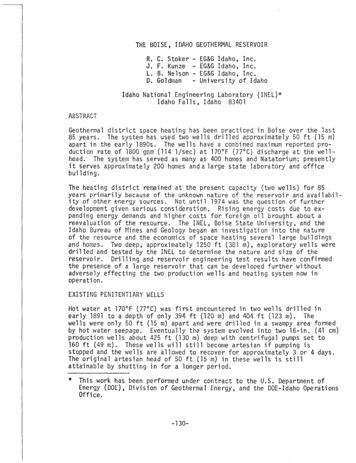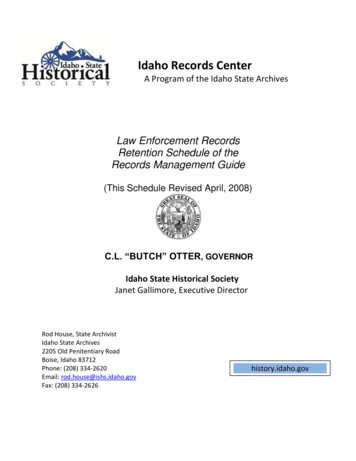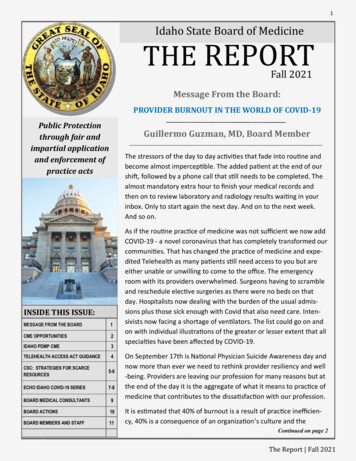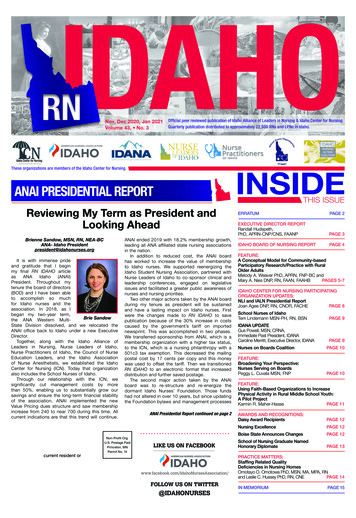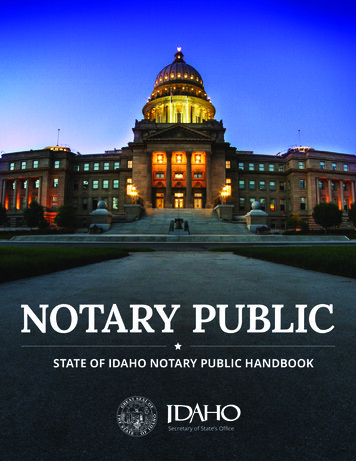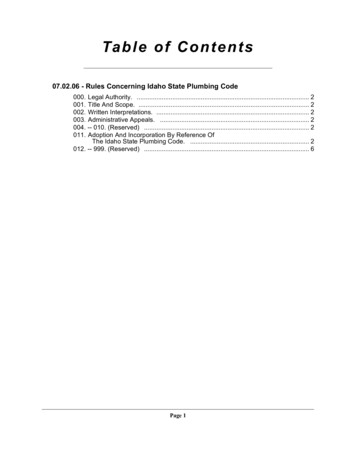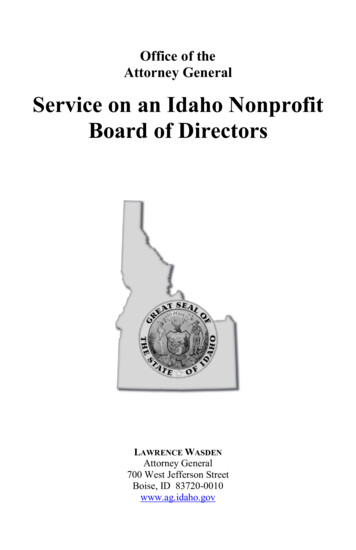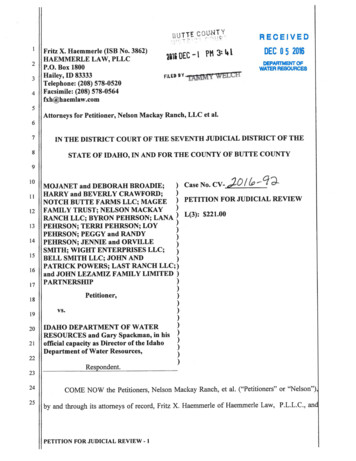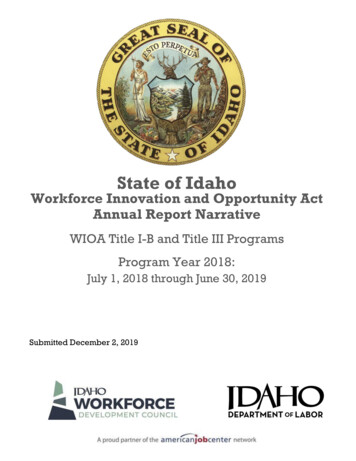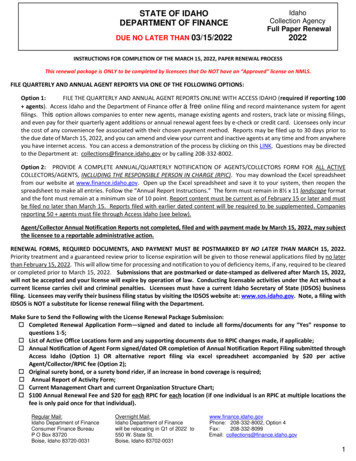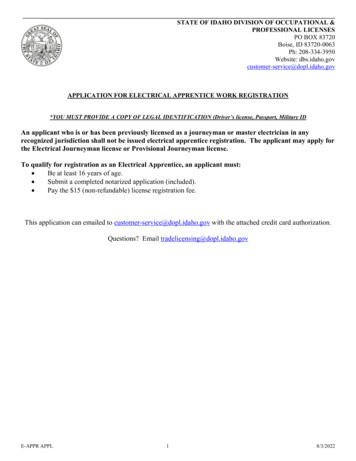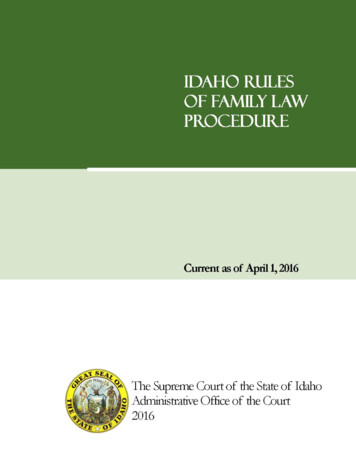
Transcription
IDAHO RULES OF FAMILY LAW PROCEDURE
IDAHO RULES OF FAMILY LAW PROCEDURETABLE OF CONTENTSSECTION I: GENERAL ADMINISTRATIONRule 101. Scope of Rules . 1Rule 102. Applicability of Other Rules . 1Rule 103. Definitions . 2Rule 104. Time . 2Rule 105. Change of Venue . 4Rule 106. Consolidation. 5Rule 107. Disqualification of Judge Without Cause . 6Rule 108. Disqualification for Cause . 7Rule 109. Voluntary Disqualification . 8Rule 110. Disqualification and Assignment of New Judge . 8Rule 111. Change of Attorneys . 8Rule 112. Appearance and Withdrawal of Counsel . 9Rule 113. Capacity to Sue or Be Sued . 10Rule 114. Infants or Incompetent Persons . 10Rule 115. Public Access to Proceedings – Trials and Hearings . 10Rule 116. Oaths and Affirmations; Written Certification; Unsworn Foreign Declarations. 11Rule 117. Conduct of Proceedings. 13Rule 118. Telephonic Appearance . 13Rule 119. Participation of Children in Proceedings . 14Rule 120. Dismissal of Inactive Cases . 15Rule 121. Dismissal of Active Cases - Voluntary Dismissal - Effect Thereof – By Petitioner – ByStipulation . 15Rule 122. Dismissal by Order of Court. 16Rule 123. Involuntary Dismissal - Effect Thereof . 16Rule 124. Costs of Previously Dismissed Action . 16Rule 125. Withdrawal of Files . 17Rule 126. Idaho Child Support Guidelines**SEPARATE DOCUMENT**Rule 127. Reclaiming Exhibits, Documents and Property. 17SECTION II: PLEADINGSRule 201. Commencement of Action. 18Rule 202. Real Party in Interest . 19Rule 203. Pleadings Allowed . 19Rule 204. Service on the Opposing Party or Additional Parties of Initial Pleadings . 20Rule 205. Mandatory Responsive Filings and Service of Responsive Filings. 24Rule 206. General or Special Appearance . 26Rule 207. Form of Pleading . 27Rule 208. General Rules of Pleading . 28Rule 209. Counterclaims and Cross-claims . 30Rule 210. Third party practice . 31Rule 211. Intervention . 32Rule 212. Signing of Pleadings, Motions, Other Papers; Sanctions; Electronic Signatures . 33Rule 213. Verification . 34Rule 214. Amended and Supplemental Pleadings – Amendments . 34Rule 215. Amendments to Conform to the Evidence . 34Rule 216. Relation Back of Amendments . 35
Rule 217. Supplemental Pleadings . 35Rule 218. Privacy Protection for Filings Made with the Court. 35SECTION III: DEFAULTSRule 301. Default – Entry . 38Rule 302. Default proof - Time limitation . 38Rule 303. Actions at Issue - Not Default . 38Rule 304. Default Judgment by the Court or Clerk . 38Rule 305. Default Judgment by the Court - Persons Exempt From . 39Rule 306. Setting Aside Default Judgment . 39Rule 307. Petitioners, Counterclaimants, Cross-Claimants Covered by Dflt. Jdgmn’t Rule 39Rule 308. Judgment Against the State . 40SECTION IV: DISCLOSURE AND DISCOVERYRule 401. Mandatory Disclosure in Contested Proceedings . 41Rule 402. Additional Discovery . 44Rule 403. Trial Preparation – Materials . 44Rule 404. Trial Preparation – Experts. 45Rule 405. Experts Not Expected as Witnesses . 46Rule 406. Fees of Expert – Apportionment . 46Rule 407. Privileged Information Withheld . 46Rule 408. Privileged Information Produced . 46Rule 409. Protective Orders . 47Rule 410. Sequence and Timing of Discovery . 47Rule 411. Signing of Discovery Requests, Responses, and Objections. 48Rule 412. (Intentionally Left Blank) . 48Rule 413. Uniform and Non-Uniform Interrogatories; Limitations; Procedure . 49Rule 414. Scope - Use of Interrogatories at Trial or on Motions. 50Rule 415. Option to Produce Records. 51Rule 416. Production of Documents and Things; Entry On Land . 51Rule 417. (Intentionally Left Blank) . 52Rule 418. Persons not Parties. 52Rule 419. Notice of Filing and Notice of Compliance . 52Rule 420. Requests for Admission. 53Rule 421. Effect of Admission. 54Rule 422. Non-filing of Requests for Admission and Responses . 54Rule 423. Use of Admissions in Court . 54Rule 424. Subpoena for Taking Depositions - Place of Examination. 55Rule 425. Depositions - Attendance Where Required . 55Rule 426. Depositions Before Action . 55Rule 427. Depositions Pending Appeal . 56Rule 428. Perpetuation by Action . 57Rule 429. Persons Before Whom Depositions May Be Taken . 57Rule 430. Depositions Upon Oral Examination. 58Rule 431. Submission to Witness - Changes – Signing . 61Rule 432. Certification by Officer and Non-filing – Exhibits . 62Rule 433. (Intentionally Left Blank) . 62Rule 434. Notice of Preparation of Transcript; Filing Notice of Mailing . 62Rule 435. Use of Deposition . 63Rule 436. Exhibits to Depositions . 63Rule 437. Failure to Attend . 63
Rule 438. Expenses . 64Rule 439. Use of Depositions . 64Rule 440. Objections to Admissibility . 65Rule 441. Effect of Errors and Irregularities in Depositions . 65Rule 442. Physical, Mental and Vocational Evaluations of Persons . 66Rule 443. Sanctions for Violation of Orders - Motion for Order Compelling Discovery . 66Rule 444. Failure to Comply With Discovery Order – Sanctions. 68Rule 445. Expenses on Failure to Admit . 69Rule 446. Failure of Party to Attend at Own Deposition or Serve Answers to Interrogatories orRespond to Request for Inspection . 69Rule 447. General Sanctions - Failure to Comply With Any Order . 69Rule 448. Expenses Against State of Idaho . 70SECTION V: MOTIONS AND INJUNCTIONSRule 501. Motion Practice . 71Rule 502. Defenses and Objections; When and How Presented; By Pleading or Motion; Motionfor Judgment on Pleadings – When Presented . 72Rule 503. Successive Applications for Orders or Writs - Motions for Reconsideration . 74Rule 504. Motions for Temporary Orders – Mandatory Disclosure . 74Rule 505. Summary Judgment . 76Rule 506. Declaratory Judgments . 77Rule 507. Injunctions - Preliminary Injunction . 78Rule 508. Temporary Restraining Order - Notice - Hearing – Duration . 78Rule 509. Form and Scope of Injunction or Restraining Order . 78Rule 510. Grounds for Preliminary Injunction . 79Rule 511. Bond or Notice Discretionary in Prohibitive or Mandatory Orders . 80Rule 512. Security Given With Injunction or Restraining Order. 80Rule 513. Evidence on Motions . 80SECTION VI: ALTERNATIVE DISPUTE RESOLUTIONRule 601. Alternative Dispute Resolution Screening . 81Rule 602. Mediation of Child Custody and Visitation Disputes . 82Rule 603. Mediation of Other Matters . 86SECTION VII: PRE-TRIAL AND TRIAL PROCEDURERule 701. Scheduling and Planning Conferences – Objectives . 89Rule 702. Scheduling and Planning Order . 89Rule 703. Subjects to be Discussed at Scheduling and Planning Conferences . 90Rule 704. Final Pre-trial Procedure - Formulating Issues . 91Rule 705. Pre-trial Stipulation . 92Rule 706. Pre-trial Order. 93Rule 707. Judicial Notice of Facts and Foreign Law . 93Rule 708. Objections to Pre-Trial Order . 94Rule 709. Exhibits and Witness Disclosure . 94Rule 710. Sanctions for Failure to Comply with Pre-trial Orders. 94Rule 711. Subpoenas. 94Rule 712. Evidence at Trial . 97Rule 713. Informal Trial . 98Rule 714. Separate trials . 99Rule 715. View of Premises, Property or Things . 99Rule 716. Appointment of Parenting Coordinator in Child Custody/Visitation Disputes . 100
Rule 717. Supervised Access to Children . 105Rule 718. Masters . 113Rule 719. Parenting Time Evaluation . 116SECTION VIII: JUDGEMENTS; POST-DECREE/POST-JUDGMENT PROCEDINGSRule 801. Findings by the Court – Effect . 120Rule 802. Amendment of Findings of Court. 120Rule 803. Judgments . 120Rule 804. Judgment Upon Multiple Claims or Involving Multiple Parties . 121Rule 805. Demand for Judgment . 122Rule 806. Satisfaction of Judgment . 122Rule 807. New Trial - Amendment of Judgment . 122Rule 808. Relief From Judgment or Order - Clerical Mistakes . 123Rule 809. Mistake, Inadvertence, Excusable Neglect, Newly Discovered Evidence, Fraud,Grounds for Relief From Judgment or Order. 124Rule 810. Harmless Error . 124Rule 811. Stay of Proceedings to Enforce a Judgment – Stay Upon Entry of Judgment . 125Rule 812. Stay on Motion For New Trial or For Judgment . 125Rule 813. Injunction – Writ of Mandate Pending Appeal . 125Rule 814. Stay Upon Appeal. . 125Rule 815. Stay in Favor of the State, Subdivision, or Agency Thereof – Waiver . 126Rule 816. Powers of Supreme Court and District Court not Limited . 126Rule 817. Stay of Judgment Upon Multiple Claims . 126Rule 818. Disability of a Judge . 126Rule 819. (Intentionally Left Blank) . 126Rule 820. Execution – In General . 126Rule 821. Judgment for Specific Acts – Vesting Title. 127Rule 822. Contempt. . 127Rule 823. Appeals of Family Law Cases . 127SECTION IX: ATTORNEY FEES AND COSTSRule 901. Costs - Items Allowed . 128Rule 902. Multiple Parties . 129Rule 903. Costs on Postponement . 130Rule 904. Nonresident Cost Bond Prohibited . 130Rule 905. Memorandum of Costs . 130Rule 906. Objections to Costs . 130Rule 907. Settlement of Costs by Order of Court . 130Rule 908. Attorney Fees . 131Rule 909. Findings . 132Rule 910. Amount of Attorney Fees . 132SECTION X: OTHER FAMILY LAW SERVICES AND RESOURCESRule 1001. Other Family Law Services and Resources . 133FORMS . 134 CAO FL 1-1 – Family Law Case Information Sheet CAO RFLPPi 1-1 – Inventory of Property and Debts CAO RFLPPi 1-2 – Uniform Family Law Interrogatories CAO RFLPPi 1-3 – Affidavit Re: Motion for Temporary Orders
SECTION I: GENERAL ADMISSIONIdaho Rules of Family Law Procedure Rule 101. Scope of Rules.These rules govern the procedure in the magistrate’s division of the district court in the State ofIdaho in all actions for divorce, legal separation, child support, child custody, and paternity; allproceedings pursuant to the Domestic Violence Crime Prevention Act; all actions pursuant to theDe Facto Custodian Act; and all proceedings, judgments or decrees related to the establishment,modification, or enforcement of orders in such actions, except contempt. These rules shall notapply to actions arising under the Child Protection Act, actions for adoption, actions fortermination of parental rights, or actions for guardianship or conservatorship. These rules shallbe liberally construed and enforced in a manner to secure the just, prompt and inexpensivedetermination of every action and proceeding.(Adopted April 2, 2014, effective for early adopters July 1, 2014, effective statewide July 1,2015; amended April 23, 2015, effective July 1, 2015.)Idaho Rules of Family Law Procedure Rule 102. Applicability of Other Rules.A. Applicability of Idaho Rules of Civil Procedure.The Idaho Rules of Civil Procedure apply only when incorporated by reference in theserules. Appeals from family law cases shall be governed by the Idaho Rules of Civil Procedure.B. Applicability of Idaho Rules of Evidence.1. Upon notice to the court filed by any party within thirty (30) days after a response orother responsive pleading is filed, or, if none, within forty-two (42) days from the filing of themotion or petition, or such other date as may be established by the court, any party may requirestrict compliance with the Idaho Rules of Evidence, except as provided in Rule 102.B.3.2. If no such notice is filed, all relevant evidence is admissible, provided, however, thatthe court shall exclude evidence if its probative value is outweighed by the danger of unfairprejudice, confusion of the issues, or by considerations of undue delay, waste of time, needlesspresentation of cumulative evidence, lack of reliability or failure to adequately and timelydisclose same. This admissibility standard shall replace rules 403, 602, 801-806, 901-903 and1002-1005, Idaho Rules of Evidence, except as provided in Rule 102.B.3. All remainingprovisions of the Idaho Rules of Evidence apply.3. Regardless of whether a notice is filed under Rule 102.B.1, records of regularlyconducted activity as defined in Rule 803(6), Idaho Rules of Evidence, may be admitted intoevidence without testimony of a custodian or other qualified witness as to its authenticity if suchdocument (i) appears complete and accurate on its face, (ii) appears to be relevant and reliable,and (iii) is seasonably disclosed and copies are provided at time of disclosure to all other parties.C. Applicability of local rules.To the extent these rules are inconsistent with local rules, the provisions of these rules shallapply.(Adopted April 2, 2014, effective for early adopters July 1, 2014, effective statewide July 1,2015.)1 Page
Idaho Rules of Family Law Procedure Rule 103. Definitions.A. Parties.Reference to a party to the action may include the State.B. Definitions.In these rules, unless the context otherwise requires, the following definitions shall apply:1. I.C.A.R. References herein to I.C.A.R. are the Idaho Court Administrative Rules.2. Motion. A motion is a written request made after a petition seeking relief isfiled. There shall be no procedure for Order to Show Cause.3. Moving Party. The party (movant or applicant) who has filed a written request forrelief, regardless of whether or not that party was the petitioner or respondent in the initialpetition.4. Petition. The petition is the initial pleading that commences a family law case or theinitial pleading that commences a post-decree matter. All initial documents shall be denominatedas a petition followed by brief descriptive wording summarizing the nature of the relief sought.5. Petitioner. A petitioner is a person or entity who files the first petition, and shall bereferred to as such in all subsequent documents, including all post-decree petitions, motions anddocuments in the same case.6. Respondent. A respondent is any opposing party other than the petitioner.7. Response. A response is a document that substantially responds to a petition or amotion, and includes a response to a petition.8. Service of Process. Service of process is the act of delivering a petition, summons,motion, notice of hearing, affidavit, brief, or any of the other documents referred to in theserules.9. Title IV-D. Title IV-D means Title IV-D of the Social Security Act, 42 U.S.C. 651 etseq. Title IV-D is administered in Idaho by the State Department of Health and Welfare.10. Venue. Refers to the particular county where a court with jurisdiction hears anddetermines the case.11. Witness. A witness is a person whose declaration under oath or affirmation isreceived as evidence for any purpose, whether such declaration is made on oral examination, bydeposition or by affidavit.(Adopted April 2, 2014, effective for early adopters July 1, 2014, effective statewide July 1,2015.)Idaho Rules of Family Law Procedure Rule 104. Time.A. Computation.In computing any period of time prescribed or allowed by these rules, by order of court, or byany applicable statute, the day of the act, event, or default after which the designated period oftime begins to run is not to be included. The last day of the period so computed is to be included,unless it is a Saturday, a Sunday or a legal holiday, in which event the period runs until the endof the next day which is neither a Saturday, a Sunday nor a holiday. When the period of timeprescribed or allowed is less than seven (7) days, intermediate Saturdays, Sundays and holidaysshall be excluded in the computation. A half holiday shall be considered as other days and not asa holiday.2 Page
B. Enlargement.When by these rules or by a notice given thereunder or by order of court an act is required orallowed to be done at or within a specified time, the parties, by written stipulation, which doesnot disturb the orderly dispatch of business or the convenience of the court, filed in the action,before or after the expiration of the specified period, may enlarge the period, or the court forcause shown may at any time in its discretion (1) with or without motion or notice order theperiod enlarged if request therefor is made before the expiration of the period originallyprescribed or as extended by previous order or (2) upon motion made after the expiration of thespecified period permit the act to be done where the failure to act was the result of excusableneglect; but the time may not be extended for taking any action under rules 802, 807.B,807.D, 807.E and 809 except to the extent and under the conditions stated in those rules.C. Additional time after service by mail.Whenever a party has the right or is required to do some act or take some proceedings within aprescribed period after the service of a notice or other paper upon the party and the notice orpaper is served upon the party by mail, three (3) days shall be added to the prescribed period.D. Blood or other genetic tests in paternity actions.If a blood or other genetic test is used to prove paternity, the blood or other genetic test reportshall be served upon the respondent with the petition or as soon as it is obtained. The blood orother genetic test report must be served upon the respondent at least twenty-eight (28) daysbefore the date set for trial, together with a notice that the blood or other genetic test will beadmitted under this rule if no objection is filed at least twenty-one (21) days in advance of trial.The verified expert's blood or other genetic test report shall be admitted at trial unless a challengeto the testing procedures or the blood or other genetic analysis has been made by a party at leasttwenty-one (21) days before the date set for trial.E. Setting hearings by court.The court upon its own initiative may notice for hearing any motion, trial or proceeding which ispending before it by notice to all parties in conformance with these rules.F. Stipulations not binding on court – continuance of trial or hearing.The parties to any action may present to the court a stipulation as to any procedural matterinvolved in any proceeding, including a stipulation to vacate or continue a hearing or trial, butsuch stipulation shall be considered as a joint motion by the parties to the court for itsconsideration, and shall not be binding upon the court. The court may approve or disapprove thestipulation in the same manner as the court rules upon a motion. The court may by oral or writtennotice to the parties limit the time within which a motion or stipulation to vacate or continue ahearing or trial must be made in order to be considered by the court.(Adopted April 2, 201
Idaho Rules of Family Law Procedure Rule 101. Scope of Rules. These rules govern the procedure in the magistrate's division of the district court in the State of Idaho in all actions for divorce, legal separation, child support, child custody, and paternity; all
